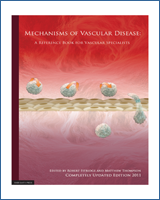From: 3, Atherosclerosis

Mechanisms of Vascular Disease: A Reference Book for Vascular Specialists [Internet].
Fitridge R, Thompson M, editors.
Adelaide (AU): University of Adelaide Press; 2011.
© The Contributors 2011.
NCBI Bookshelf. A service of the National Library of Medicine, National Institutes of Health.